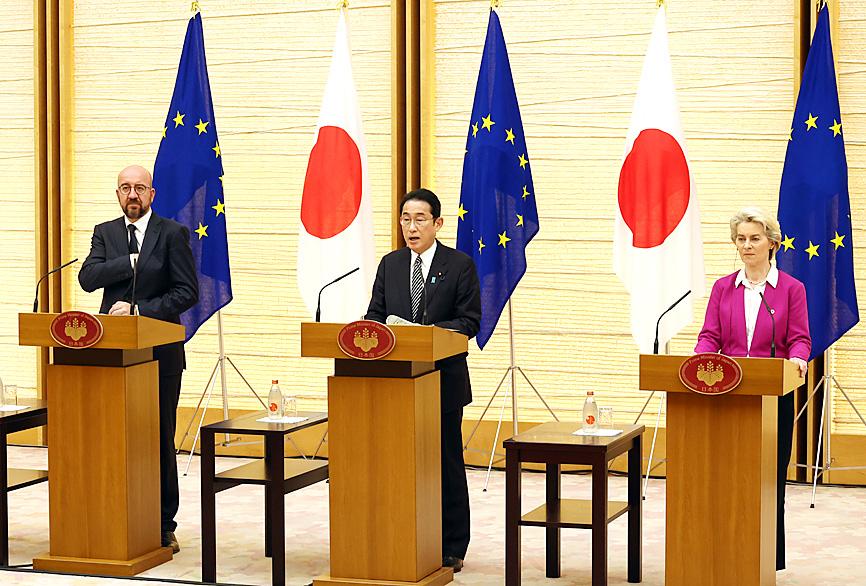Japan and the EU on Thursday reaffirmed “the importance of peace and stability across the Taiwan Strait” in a joint statement at their summit, which focused on coordinating strategies in the Indo-Pacific region.
“We underscore the importance of peace and stability across the Taiwan Strait, and encourage the peaceful resolution of cross-strait issues,” said the joint statement, issued at the 28th EU-Japan Summit in Tokyo.
It was the second such reference to Taiwan in a joint statement by the leaders of Japan and the EU, following a statement issued at last year’s summit.

Photo: EPA-EFE
At this year’s summit, European Council President Charles Michel and European Commission President Ursula von der Leyen met Japanese Prime Minister Fumio Kishida to discuss global and regional challenges as well as bilateral relations, they said in the statement.
The leaders condemned Russia’s invasion of Ukraine, and demanded that Moscow immediately and unconditionally withdraw all forces and military equipment from the country, the statement said.
The EU and Japan “strongly oppose any unilateral attempt to change the status quo by force, regardless of the location, as a serious threat to the entire international order,” it added.
They vowed to involve ASEAN, South Asian and Pacific Island countries in establishing “synergies” among their strategies to ensure a free and open Indo-Pacific region, it said.
In Taipei, the Ministry of Foreign Affairs yesterday said that Taiwan welcomed the joint statement and expressed sincere gratitude to the leaders of the EU and Japan.
The statement was further testimony that maintaining peace and stability in the Taiwan Strait is a consensus among democratic countries, ministry spokeswoman Joanne Ou (歐江安) said.
Amid challenges posed by aggressive expansion of authoritarian regimes that have undermined the international rules-based order and regional stability, Taiwan will continue to deepen cooperation with Japan, the EU and like-minded countries to safeguard shared values of justice, freedom and democracy, she said.

OPTIMISTIC: The DGBAS sharply upgraded its GDP growth estimate from 3.54 percent to 7.71 percent after the Taiwan-US trade agreement signing and given AI optimism The US imported more from Taiwan than China for the first time in decades, as US President Donald Trump’s tariffs reshape trade flows while a global boom in artificial intelligence (AI) fuels demand for tech products. US purchases of goods from China plunged almost 44 percent in December last year from 2024 to US$21.1 billion, US Department of Commerce data showed on Thursday. By contrast, shipments from Taiwan more than doubled during the same period to US$24.7 billion. The soaring Taiwanese shipments to the US reflect the huge expansion in supplies of chips and servers for AI companies, which has completely changed

NON-NEGOTIABLE: The US president’s action ran counter to one of the US’ ‘six assurances’ on not consulting China about arms sales to Taiwan, US lawmakers said US President Donald Trump’s admission that he is discussing arms sales to Taiwan with Chinese President Xi Jinping (習近平) is “alarming and a blatant violation of US policy and the six assurances,” US Representative Ro Khanna said on Tuesday. Trump on Monday said he would decide soon on whether to send more weapons to Taiwan, after Xi warned him not to do so. “I’m talking to him about it. We had a good conversation, and we’ll make a determination pretty soon,” Trump told reporters aboard Air Force One when asked about warnings raised by Beijing during a phone call with Xi over

US and Chinese fighter jets briefly faced off above waters near the Korean Peninsula this week, Yonhap News agency reported, marking a rare confrontation in that area between the two superpowers. About 10 US fighter jets on Wednesday departed an airbase in Pyeongtaek, South Korea, for drills above international waters off South Korea’s western coast, the news outlet cited unidentified military sources as saying. While the US planes did not enter China’s air defense identification zone, Beijing scrambled planes as they neared that region, the report said. “The Chinese People’s Liberation Army organized naval and air forces to monitor and effectively respond

VACILLATING? Some US officials are concerned that Trump’s April visit to Beijing might be affected if Washington pushes through additional weapons sales to Taiwan A major US arms sales package for Taiwan is in limbo following pressure from Chinese President Xi Jinping (習近平) and concerns among some US officials that greenlighting the deal would derail US President Donald Trump’s upcoming visit to Bejing, the Wall Street Journal (WSJ) reported on Wednesday. Trump on Monday said that he would decide soon on whether to send more weapons to Taiwan, after Xi warned him not to do so. “I’m talking to him about it. We had a good conversation, and we’ll make a determination pretty soon,” Trump told reporters aboard Air Force One when asked about warnings raised